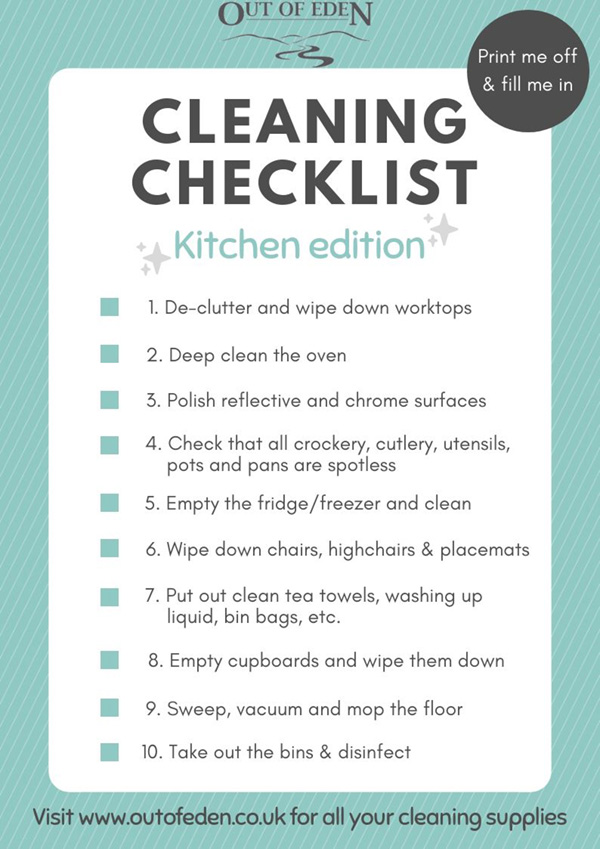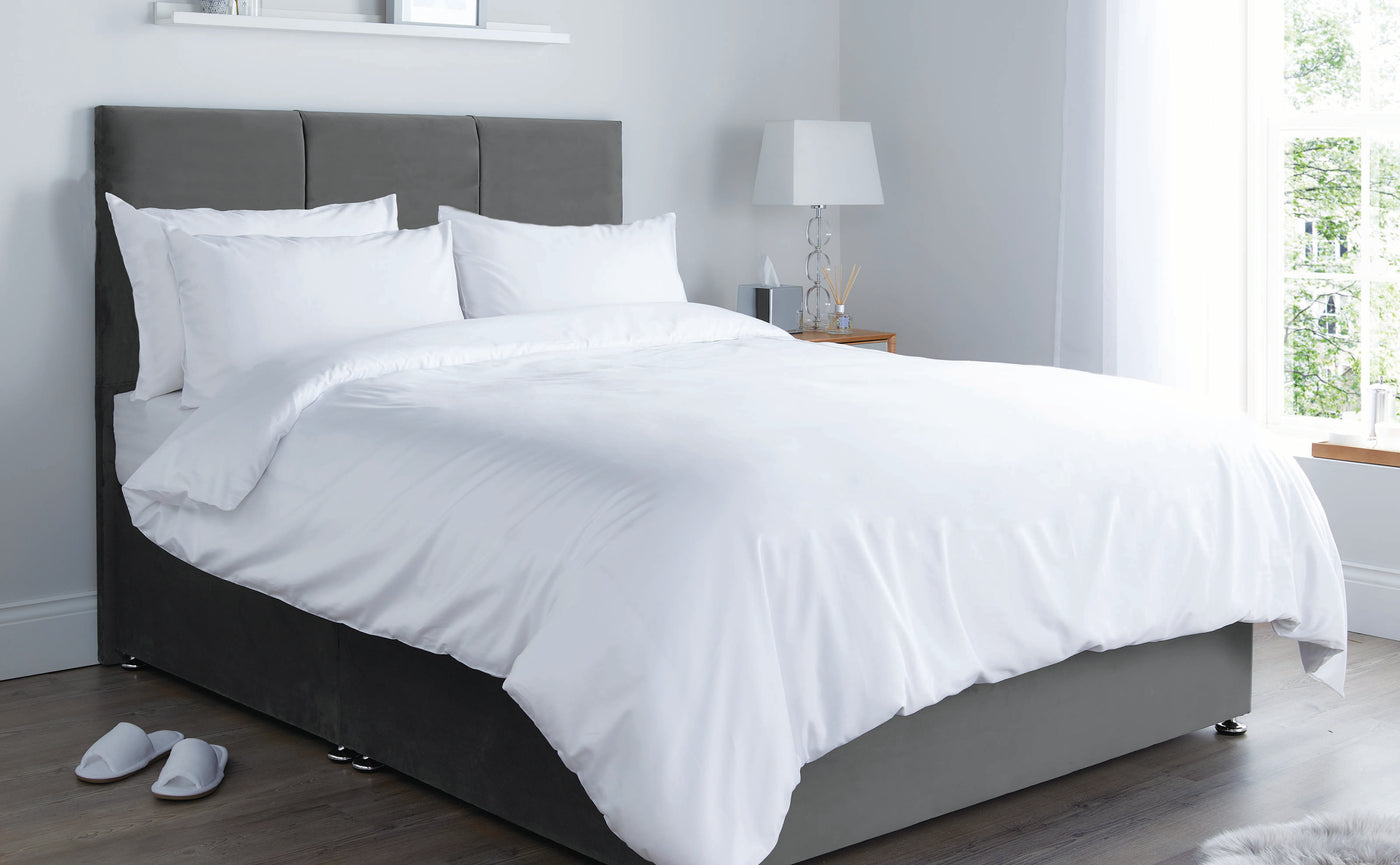They say that the kitchen is the heart of the home, so making sure it's spick and span ready for your guests' arrival is absolutely essential for ensuring they leave with that great overall impression.
With so many cleaning products on the market, we thought we’d go back to basics with some top tips for getting those great cleaning results with a few simple household staples and handy tips and tricks...
1. Have a cleaning checklist
With short turnaround times and the pressure to leave every room spotless, completing a checklist each time you clean is a great way to ensure you’ve covered everything. We’ve created this free, downloadable kitchen cleaning checklist, ideal for any self-catering property or accommodation with catering facilities.
Remember, a big aspect of your guests’ trip will largely surround the cleanliness of your property, so make your limited turnaround times a little more manageable with a trusty list:

2. When life gives you lemons
…Use them to clean! Lemon juice is naturally high in critic acid making it a perfect natural cleaner, while the antibacterial properties help to create a hostile environment for bacteria including E Coli and Salmonella, preventing them from spreading.
There are a million and one ways you can use lemons for cleaning, but here are just a few of our favourite ways:
- Add lemon peel and some water to a dish and microwave it for three minutes. Grime and grease can then be effortlessly wiped away and your microwave will be left smelling sweet and citrus-scented.
- Once you’ve used the lemon rind, add it to a jar along with some white vinegar for a natural, homemade all-purpose kitchen cleaner. While white vinegar is a great natural cleaner due to its high acidity, the pungent smell can be counteracted with the fresh lemon zest to add a refreshing smell with some added antibacterial properties.
- Lemon, with a little added salt, can also be used to break down stains on chopping boards, tackle stubborn stuck-on food on cutlery, and even make your worn copper pots look brand new. Simply pop some coarse salt on to the desired spot and scrub away with half a lemon – you’ll be impressed with the results in no time at all!
3. Salt fights stubborn stains
Salt, like lemons, isn't just useful for adding flavour to food, but can in fact be wholly effective for cleaning too, particularly on tough stains. Whether you’re tackling mildew on tiles, grease on pots and pans or baked-on food in a casserole dish, put the harsh, toxic bleach products down and pick up your table salt instead.
The coarseness of salt makes it an effective yet gentle scouring agent, but when used with white vinegar or water & baking soda, creates a powerful scrub to help clean and deodorise without the need for harmful chemicals.
4. Give your kettle a new lease of life
Limescale is the build-up of a tough white deposit otherwise known as calcium carbonate, which commonly occurs in kettles, old pipes and hot water tanks.
Given that, as a nation, we consume approximately 120 million cups of tea a year, it’s no surprise that limescale build-up is a common problem in our kettles. Not only can limescale affect the taste of boiled water and the efficiency of a kettle’s ability to boil, above all it can be very unsightly for your guests.
Rather than tackling the issue with potentially harmful chemical-based cleaning products, simply boiling lemon juice or white vinegar can do the trick just as well – just remember to rinse the kettle out a few times before your next guests arrive!
5. We're nuts about coconut oil
Coconut oil has become an increasingly popular staple in many households over the past few years for both cooking and beauty use, but its versatility doesn’t end there. Coconut oil has great antibacterial properties ideal for cleaning, while the consistency makes it a great product to use for buffing and polishing.
To make your stainless steel kitchen appliances gleam, rub a small amount of coconut oil on to the appliance and buff away any marks or pesky fingerprints. Then, with a dry cloth, rub away the excess oil to leave a spotless, shiny surface.
Coconut oil is also used for buffing leather products or furnishings, as an effective furniture polish when mixed with lemon juice and can even remove any crayon doodles thoughtfully left by little guests.
6. Repurposing coffee grounds & teabags
It’s great to use household staples such as lemons, salt and baking powder rather than having to buy an entire caddy of cleaning products, but being able to repurpose items is even better. Old coffee grounds, for instance, are great for balancing pH levels in compost piles allowing food to degrade quicker, while the smell balances out the odour.
Alternatively, they also work as great insect repellers, homemade plant fertilisers, and can even alter the colour of Hydrangeas from pink to blue depending on acidity levels!
Black tea, on the other hand, can be used as a homemade glass cleaner (ideal for grimy windows) or even give a new shine to wooden furniture and flooring.
7. Tackling tea/coffee stained mugs
Mugs are naturally susceptible to occasional staining from time-to-time, especially in a self-catering environment where guests may potentially neglect their washing up while on their jollies – and who can blame them?
Tea and coffee stained mugs can be easily treated with bicarbonate of soda and a damp cloth. Mixed with a little bit of water, the bicarb will create a thick paste allowing you to scrape away any staining in no time at all.
8. Pesky pet hair
Going pet-friendly in your accommodation has a range of benefits, but it’s important to acknowledge the cons that can come with allowing animals to stay with you, too. For one, pet hair can make its way on to your furnishings and removing them can be a tricky and time-consuming process.
Of course, you want every guest to feel like their stay is the first, so it's crucial to get your property looking like a new pin.
Though hoovering will remove the majority of hairs, we recommend using rubber gloves or even a squeegee to brush against the grain and get those last few sneaky hairs hiding away in furnishings, carpet and rugs.







